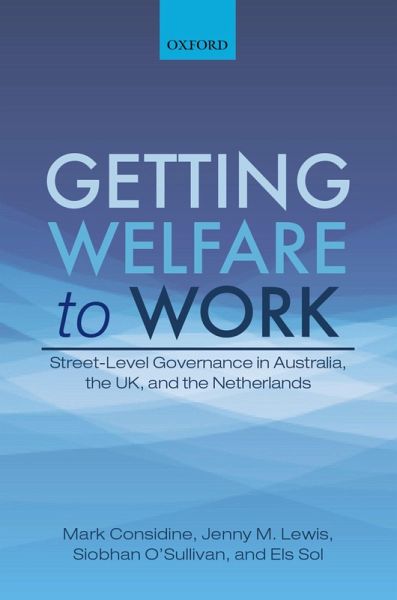
Getting Welfare to Work (eBook, PDF)
Street-Level Governance in Australia, the UK, and the Netherlands
Versandkostenfrei!
Sofort per Download lieferbar
44,95 €
inkl. MwSt.
Weitere Ausgaben:

PAYBACK Punkte
22 °P sammeln!
Getting Welfare to Work traces the radical reform of the Australian, UK, and Dutch public employment services systems. Starting with major changes from 1998, this book examines how each national system has moved from traditional public services towards more privately provided and market-based methods. Each of these three countries developed innovative forms of contracting-out and complex incentive regimes to motivate welfare clients and to control the agencies charged with helping them. The Australian system pioneered the use of large, national contracts for services to all unemployed jobseeke...
Getting Welfare to Work traces the radical reform of the Australian, UK, and Dutch public employment services systems. Starting with major changes from 1998, this book examines how each national system has moved from traditional public services towards more privately provided and market-based methods. Each of these three countries developed innovative forms of contracting-out and complex incentive regimes to motivate welfare clients and to control the agencies charged with helping them. The Australian system pioneered the use of large, national contracts for services to all unemployed jobseekers. By the end of our study period this system was entirely outsourced to private agencies. Meanwhile the UK elected a form of contestability under Blair and Cameron, culminating in a new public-private financing model known as the 'Work Programme'. The Dutch had evolved their far more complex system from a traditional public service approach to one using a variety of specific contracts for private agencies. These innovations have changed welfare delivery and created both opportunities and new constraints for policy makers. Getting Welfare to Work tells the story of these bold policy reforms from the perspective of street-level bureaucrats. Interviews and surveys in each country over a fifteen year period are used to critically appraise this central pillar of the welfare state. The original data analysed in Getting Welfare to Work provides a unique comparative perspective on three intriguing systems. It points to new ways of thinking about modes of governance, system design, regulation of public services, and so-called activation of welfare clients. It also sheds light on the predicament of third sector organisations that contract to governments through competitive tenders with precise performance monitoring, raising questions of 'mission drift'.
Dieser Download kann aus rechtlichen Gründen nur mit Rechnungsadresse in A, B, BG, CY, CZ, D, DK, EW, E, FIN, F, GR, HR, H, IRL, I, LT, L, LR, M, NL, PL, P, R, S, SLO, SK ausgeliefert werden.













